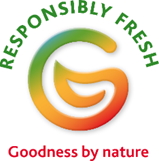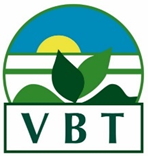The collective sustainability project of the Belgian cooperative fruit and vegetable sector bundles the actions and efforts in the sustainability report 2021


At the horticultural farm of Joris Christianen, the Association of Belgian Horticultural Cooperatives has presented the sustainability report 2021 to its stakeholders. Also, a first copy of the report was handed over to the Flemish Minister of Agriculture Hilde Crevits. Within the collective project Responsible Fresh Goodness by nature, the five producers’ cooperatives and the 3,400 producers continue their sustainable development.
In February 2019, the Belgian cooperative fruit and vegetable sector has announced its continuation of the collective sustainability project. For six years (2012-2018), the members-producers’ organizations (POs) and their producers have been working within Responsibly Fresh. With Responsibly Fresh Goodness by nature, the participants confirmed their continuation on the way to sustainable development. The Chair of the Association of Belgian Horticultural Cooperatives (VBT), Rita Demaré states: ‘The sector remains responsibly – being both responsible and accountable or socially engaged. The baseline Goodness by nature expresses, besides Fresh, again that fruit and vegetables are naturally healthy.’
Three pillars
With Responsibly Fresh Goodness by nature, VBT, the five POs and the 3,400 affiliated producers connect to the Sustainable Development Goals (SDGs) of the United Nations (UN). Further, the actions and efforts are elaborated within the frame of the Farm to fork strategy of the European Commission. Concretely, the collective sustainability project focusses on three pillars.
- The producers opt deliberately to take a cooperative approach, because they are stronger when they stand together. Cooperative entrepreneurship is sustainable entrepreneurship.
- Fruit and vegetables are naturally healthy. They provide a wealth of flavours, and contribute towards a varied diet. The sector is focussing on food safety and preventing food losses.
- The sector is committed to progress while respecting the elements of nature by growing fruit and vegetables with minimal impact on the environment.
External certification
- The POs continued their participation in the Sustainable Enterprise Charter of Flanders’ Chambers of Commerce and Industry (VCDO). Because they received a VCDO certificate three times within a five-year period, ten actions were positively evaluated in at least four of the five pillars (people, planet, partnerships, peace, prosperity) and actions were carried out within each of the 17 SDGs, the POs are awarded with the international certificate from the UN and Cifal Flanders/UNITAR: SDG Pioneer. Details about the charter and the actions of the POs are available at their website and/or in their individual sustainability reports.
- As it is customary, the member producers have a valid certificate for the Vegaplan Standard for Primary Crop Production and/or the GLOBALG.A.P. Integrated Farm Assurance (IFA) standard. A condition of the POs for market access.
- The POs focus further on the sustainable development of the labour and social conditions. Since 2017, the member producers of the POs have been assessed on the GLOBALG.A.P. social module GRASP (GLOBALG.A.P. Risk Assessment on Social Practice). As a next step, the POs are evaluated on the social module FIAS (Freiwillige QS Inspektion Arbeits- und Sozialbedingungen) of the German quality system Qualität und Sicherheit (QS).
Collective achievements
The POs as well as the producers have been questioned on a number of key elements of sustainable development. The collective results for each pillar and SDG are presented in the sustainability report. Some examples:
Pillar 1 – Cooperative entrepreneurship is sustainable entrepreneurship
- The POs provide employment (1,142 FTE), turnover (well over 1 billion euro) and exports.
- The POs occupy an important place in the value chain – one-stop-shopping results in a short and efficient supply chain. In this way, the POs improve the income of the 3,400 affiliated producers.
- Within VBT, preparations are made to continue activities in the South, to be resumed after the COVID-19 pandemic.
Pillar 2 – Sustainable produced, healthily consumed
- The POs actively encourage the consumption of fruit and vegetables – four million euro of promotional resources in VLAM.
- The POs attach great importance to food safety and product quality – 100% validated self-inspection systems at POs and producers.
- The POs focus on the value retention chain for one million tons of fruit and vegetables. The POs do everything they can to trade the entire product supply on the fresh market, from asparagus to zucchini. Less than 2% of the supply is not commercially sold, but valued by being distributed free of charge (mainly to foodbanks) or by being used for animal feed or for composting or biogas plants.
- Accurate packaging protects the products and contribute to food thrift. On average 73 kg of packaging material is used per ton product, of which 68 kg re-usable commercial, 4.2 kg single-use commercial, and 700 grams single-use household packaging. Within the last category, the share of paper and cardboard increased from 16% in 2018 to 40% in 2020.
Pillar 3 – Progress with respect for the elements of nature
- The POs are constantly investing, collectively and individually, in research and development – 20 or so VLAIO LA-trajecten research projects receive sector finance.
- Both the POs and the producers are committed to water-saving measures. The producers have a total of 10 million m³ collecting capacity for rainwater.
- POs and producers are partly using their own electricity production – more than 200 companies with CHP (combined heat and power system) and 1,000 with solar panels.
- Various options are used and further researched for limiting energy consumption. At 10% of the producers this is based on energy scans.
- Sustainable alternatives are also applied for logistics and mobility.
- Within VBT, POs and producers monitor the developments regarding Life Cycle Analysis (LCA).
- Integrated crop protection and pest management has been the standard for many years.
- Concerned producers act responsibly with the soil.
- POs and producers collectively contribute to maintaining biodiversity.
VBT General Secretary Luc Vanoirbeek concludes: ‘Achieving further sustainable development is what we, together with our five member-POs and the 3,400 member producers, have been doing in recent years and which we will continue to focus on in the years ahead. Because the process of achieving sustainability is always changing and on the move and so can never come to an end. If we continue to work together with as much passion and enthusiasm as we have in the past, we will definitely make progress towards more sustainability.’
More information: www.responsiblyfresh.eu
Participating producers’ organisations:

Contact: Luc Vanoirbeek – VBT General Secretary – Tel +32 (0) 477 330 635

